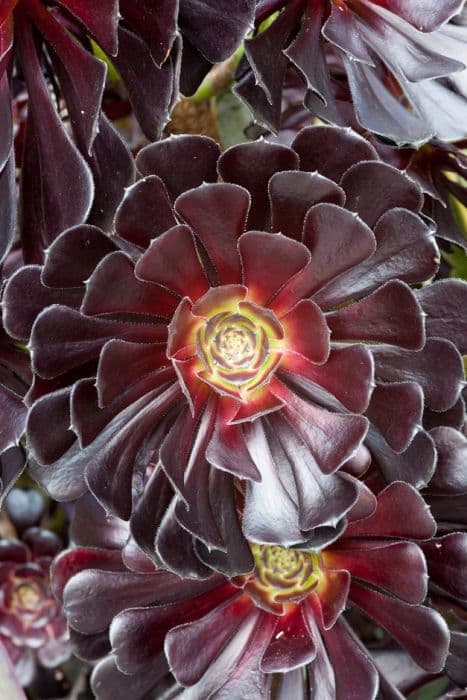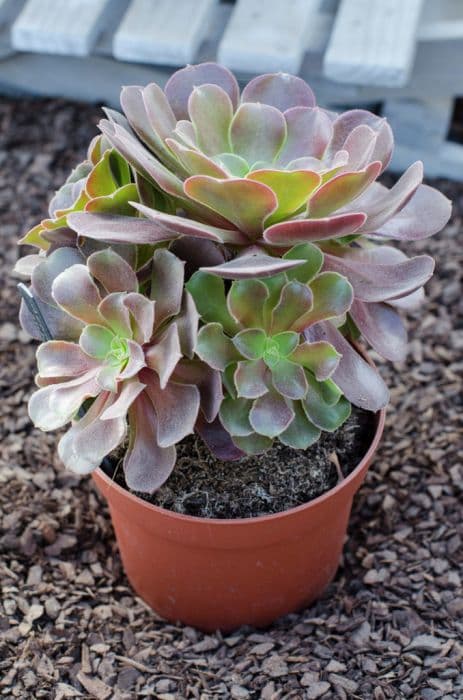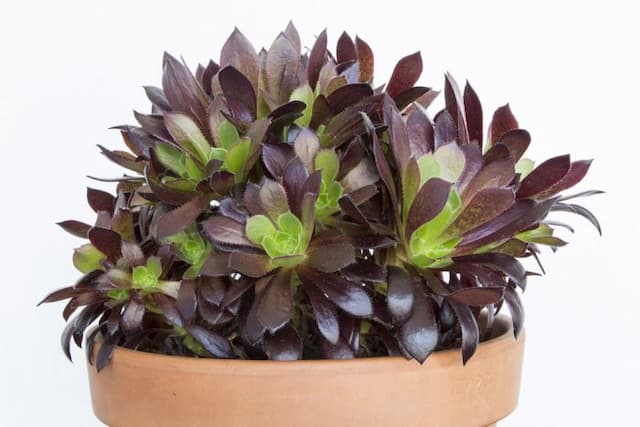Hens and Chicks Jovibarba heuffelii 'Angel Wings'

ABOUT
Jovibarba heuffelii 'Angel Wings', commonly known as Hen and Chicks, is a captivating succulent with a lush rosette growth habit. This plant is aptly named for the 'wings,' which refer to its broad leaves that often possess a soft, angelic quality in their texture. The leaves are typically thick and fleshy, showcasing a blend of subtle green tones that may be tinged with hints of purple or pink on the edges, especially when exposed to bright light or cool conditions. The leaves radiate from a central point, creating a rounded, symmetrical shape that looks almost like a flower from a distance. The foliage may have a slightly glossy or waxy surface, contributing to its charming appearance, while the tips of the leaves can sometimes appear slightly pointed, giving the rosette an added sense of depth and dimension. Over time, Hen and Chicks can produce smaller rosettes, or "chicks," that cluster around the main rosette, or the "hen," hence the name. These offsets can contribute to a denser appearance as they grow and populate around the parent rosette, leading to a delightful clustering effect that makes the Hen and Chicks a favorite among gardeners and houseplant enthusiasts alike. The overall appearance of Jovibarba heuffelii 'Angel Wings' is one of robust beauty, with its thick leaves forming a compact and alluring rosette suggestive of its celestial namesake. The plant's aesthetic allows it to stand out in rock gardens, container plantings, or as part of a succulent collection. Its appealing rosettes embody both hardiness and grace, making the Hen and Chicks a visually appealing addition to various garden settings or indoor displays.
About this plant
 Names
NamesFamily
Crassulaceae
Synonyms
Heuffel's Jovibarba, Heuffel's Hens and Chicks, Hens and Chicks
Common names
Jovibarba heuffelii.
 Toxicity
ToxicityTo humans
Jovibarba heuffelii, commonly known as job's beard, is generally considered non-toxic to humans. There are no well-documented cases of poisoning from ingesting this plant, and touching it is not known to cause skin irritation in most individuals. However, as with any plant, individual allergies or sensitivities can occur, so it's always a good idea to exercise caution and avoid ingesting plants that are not commonly recognized as edible.
To pets
Job's beard is also regarded as non-toxic to pets. It does not contain harmful substances that would lead to poisoning in animals. Consequently, if a pet were to ingest a piece of this plant, they are unlikely to experience any significant adverse symptoms. Nonetheless, it's always best to prevent pets from eating ornamental plants, as they could cause gastrointestinal upset or other issues due to the digestive system not being accustomed to processing such material.
 Characteristics
CharacteristicsLife cycle
Perennials
Foliage type
Evergreen
Color of leaves
Green
Flower color
Yellow
Height
0.5 feet (15 cm)
Spread
0.5 feet (15 cm)
Plant type
Succulent
Hardiness zones
5
Native area
Southeast Europe
Benefits
 General Benefits
General Benefits- Easy to care for: Jovibarba heuffelii 'Angel Wings' is low maintenance, requiring minimal watering and care.
- Suitable for xeriscaping: This plant is drought-tolerant and ideal for water-wise gardens.
- Attractive foliage: It features distinctive rosettes with a unique texture and color, adding visual interest to the garden.
- Hardy: It's resilient to cold temperatures and capable of surviving harsh winter conditions.
- Propagation through offsets: The plant produces small offsets that can be easily propagated to create new plants.
- Rock garden suitability: Its compact size and growth habit make it perfect for rock gardens or alpine displays.
- Container gardening: It can thrive in pots or containers, making it versatile for various garden settings.
- Year-round interest: Jovibarba heuffelii 'Angel Wings' maintains its appearance throughout the year, providing consistent garden appeal.
- Attracts pollinators: While not their primary benefit, the plant can occasionally draw in bees and beneficial insects when it flowers.
- Erosion control: It can help stabilize soil on slopes or in areas prone to erosion.
 Medical Properties
Medical PropertiesThis plant is not used for medical purposes.
 Air-purifying Qualities
Air-purifying QualitiesThis plant is not specifically known for air purifying qualities.
 Other Uses
Other Uses- Photography Projects: Jovibarba heuffelii 'Angel Wings,' also known as Sempervivum heuffelii, makes an appealing subject for close-up and macro photography due to its intricate rosette patterns and textures.
- Artistic Inspiration: The symmetrical form and unique appearance of Sempervivum heuffelii can inspire patterns and designs in various art mediums, from textiles to graphic design.
- Education: The plant can be used in educational settings to teach children about plant growth, propagation, and succulent care.
- Culinary Decoration: The attractive rosettes can be used as a non-toxic decorative element on plates and platters for special dining occasions, although they are not intended for consumption.
- Jewelry Making: Its rosettes can be incorporated into botanical jewelry designs such as resin pendants or earrings after being properly dried and preserved.
- Theme Gardens: Create a fairy or fantasy-themed garden by incorporating Sempervivum heuffelii as part of the miniature landscape to add charm and whimsical elements.
- Stress Relief: Caring for and observing the growth patterns of this plant can serve as a form of relaxation and a way to de-stress for plant enthusiasts.
- Workshop/Event Decor: Small pots of Sempervivum heuffelii can be used as natural, long-lasting table decorations for workshops or eco-friendly events.
- Collectors' Specimens: Due to the many varieties and unique features, Sempervivum heuffelii can be a sought-after addition to succulent collectors' displays.
- Seasonal Arrangements: The plant can be included in living wreaths or seasonal arrangements around autumn and winter due to its hardiness and evergreen nature.
Interesting Facts
 Feng Shui
Feng ShuiThe Jovibarba heuffelii is not used in Feng Shui practice.
 Zodiac Sign Compitability
Zodiac Sign CompitabilityThe Jovibarba heuffelii is not used in astrology practice.
 Plant Symbolism
Plant Symbolism- Resilience: Jovibarba heuffelii 'Angel Wings', commonly known as Sempervivum heuffelii, is known for its ability to thrive in harsh conditions, symbolizing the resilience and strength to overcome challenges.
- Protection: The thick, fleshy leaves of Sempervivum heuffelii can retain water, signifying protection and self-sufficiency in tough environments.
- Endurance: Reflecting its perennial nature, this plant exemplifies endurance and the capacity to persist through various seasons of life.
- Eternal love: Being a plant that multiplies and propagates easily, it's associated with enduring affection and the continuity of love beyond obstacles.
- Healing: Historically, certain sempervivums are believed to possess medicinal properties, which lends this plant a symbolic meaning of healing and recovery.
 Water
WaterFor the Hens and Chicks (Jovibarba heuffelii 'Angel Wings'), water thoroughly but infrequently, allowing the soil to dry out completely between waterings. On average, this might be once every week to 10 days during the active growing season in spring and summer, though this frequency may decrease to once a month or less during winter when the plant is dormant. Apply enough water to soak the roots, which could amount to around 8-16 ounces for small to medium pots. Over-watering or letting the plant sit in water can lead to root rot, so ensure proper drainage.
 Light
LightHens and Chicks thrive in full sun to partial shade. Place the plant in a spot where it will receive at least six hours of sunlight daily. They can tolerate some light shade, particularly in the afternoon, which can help protect them from the scorching sun during the hottest part of the day.
 Temperature
TemperatureHens and Chicks prefer temperatures between 65°F and 75°F but can survive in temperatures as low as 20°F and as high as 90°F. The plant can tolerate a frost but should be protected from prolonged freezing temperatures to avoid damage.
 Pruning
PruningPruning Hens and Chicks is typically done to remove dead or damaged leaves and to maintain the plant's appearance. You can prune any time of the year, but it is best to do so in the spring or early summer when the plant is actively growing. Remove only the necessary leaves, and the plant will produce offsets to replace them.
 Cleaning
CleaningAs needed
 Soil
SoilHens and Chicks (the common name for Jovibarba heuffelii 'Angel Wings') thrives in well-draining, sandy or gritty soil with a neutral to slightly acidic pH of 6.0 to 7.0. A suitable soil mix for Hens and Chicks can be created by combining one part potting soil, one part coarse sand, and one part perlite or pumice.
 Repotting
RepottingHens and Chicks should be repotted every two to three years or when the container becomes crowded. This plant prefers not to be disturbed too often, as it enjoys a tight fit in pots which helps promote flowering.
 Humidity & Misting
Humidity & MistingHens and Chicks is tolerant of a wide range of humidity levels and does well in typical household humidity. No specific humidity requirements need to be met for this succulent.
 Suitable locations
Suitable locationsIndoor
Place in bright, indirect light with good airflow.
Outdoor
Needs full sun to light shade and well-draining soil.
Hardiness zone
4-9 USDA
 Life cycle
Life cycleJovibarba heuffelii 'Angel Wings', commonly known as Sempervivum heuffelii, begins its life cycle when seeds germinate in well-draining soil with adequate light and warmth. Seedlings emerge displaying small, succulent rosettes that mature and grow, forming clusters as they develop. The plant reaches maturity in a few years, during which it may produce offsets or "pups," which are small rosettes that detach to form new plants, propagating vegetatively. Flower stalks emerge from the center of the rosettes in mature plants, usually in the late spring or summer, bearing star-shaped flowers. After flowering, which is often a signal of the end of the individual rosette's life cycle because these plants are monocarpic, meaning the rosette dies after blooming, the plant relies on its offsets to continue its lineage. Throughout the year, this hardy perennial can withstand cold temperatures and drought, entering a dormant stage during adverse conditions and resuming growth with the return of favorable weather.
 Propogation
PropogationPropogation time
Spring to Summer
Jovibarba heuffelii 'Angel Wings', commonly known as Hen and Chicks, can be propagated most effectively through division. This method involves separating the offsets, which are the small rosettes that form around the base of the parent plant. Propagation is best done in the spring or early summer when the plant is actively growing. To propagate by division, gently remove the offsets from the main plant with a clean, sharp knife. Ensure that each offset has a piece of the root system attached. Then, plant these offsets in well-draining soil, watering them lightly to encourage root development. Typically, offsets will establish their own root system and start growing as individual plants within a few weeks.









